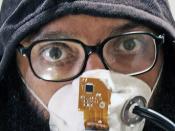Milgram's experiment is not very ethical when compared to the BPS guidelines.
Consent
Milgram's subjects did have to consent to the experiment, but they weren't given enough knowledge to make an informed decision about it. As far as the subject was aware, they were 'standing in' for Milgram's partner, and were taking the role as his assistant. In actual fact, Milgram's partner was the person being 'shocked', and great deception was used from the outset.
Deception
Deception was widely used in Milgram's experiment. Right from the start, the subject was deceived by the motives of Milgram's experiment. It is not an experiment on the affect of electric shocks on learning, it was an experiment aiming to see how far the subject would be willing to go, when instructed by an authoritative figure.
During the experiment, Milgram's assistant was never being shocked, but the subject was deceived into believing that the shock was really being given.
Although the debrief did explain what really happened, deception was still widely used.
Debriefing
Milgram did give his subjects a full debriefing about the study, so the subjects were aware of what they had taken part in. This is still quite unethical, because had the subject had the knowledge offered in the debrief prior to giving consent, they may have had a different opinion.
Withdrawal from the Investigation
The subjects were pressured into continuing the experiment, even when showing discomfort in what they were asked to carry out. The subject could have probably withdrew if they really wanted to, but Milgram tried to pressure the subject into continuing the experiment.
Protection of Participants
Some of the subjects could have been under intense psychological pressure when asked to carry out electric shocks on Milgram's assistant. Although the subject would have been told in the...


